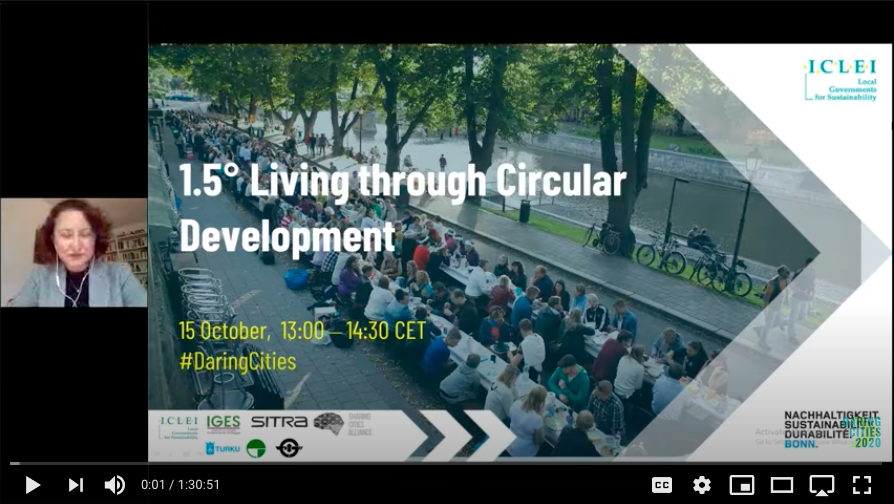
In order to access the video, you must create an account on Daringcities.org or log-in.
It is a commonly accepted fact that changes in consumption patterns and dominant lifestyles are a critical and integral part of the solutions package to address climate change. Recent studies such as IGES’s 1.5-Degree Lifestyles illustrate the scale of the sustainable living challenge: the need for reductions of over 80% in GHGs by 2050 from today’s intensity of lifestyles. This study proposes we need to aim for lifestyle carbon footprints targets of 2.5 (tCO2e) in 2030, 1.4 by 2040, and 0.7 by 2050. Even developing countries need to reduce footprints by 23–84%, depending on the country and the scenario, by 2050.
Similarly, shifting to renewable forms of energy production can get us only a bit more than half of the required reductions in global greenhouse gas emissions (GHG). In order to tackle the remaining half, consumption patterns and dominant lifestyles need to be shifted with the support of circular economy interventions. Consumer choices for eco-designed products need to be available and accessible, waste within product chains and end-of-product-life need to be eliminated, keeping materials in use need to be easy for consumers and regenerative forms of living need to be supported.
Cities, where consumption and production meets, provide the perfect leverage points for enabling this urgently required shift. A few daring cities are taking action integrating circularity into their own municipal services, also enabling circular business models to flourish, making resource-efficient products more accessible and creating awareness among city dwellers and empowering citizen-led initiatives. In this sense, a daring 1.5- Degree living policy package at an urban systems level mindfully tackles citizens’ and stakeholders’ sustainability attitudes, facilitators or access to sustainable options, and the supporting infrastructure.
This session provides insights into the leading city practices around the world aiming at 1.5-Degree Living. The cities share the circular economy measures and innovative policy instruments that they have developed in the three priority domains – nutrition, housing, and mobility – with the largest impact (approximately 75%) on city dwellers’ carbon footprints. In addition, barriers that are faced by city governments and potential solutions for scaling up these interventions are discussed.
Facilitator:
- Burcu Tuncer, Head of Circular Development, ICLEI World Secretariat, Germany
Opening note:
- Dr. Satoshi Kojima, Principle Coordinator, Strategic Management Office IGES, Tokyo, Japan
Panelists:
- Liisa Lahti, Circular Turku Project Manager, City of Turku, Finland
- Lotte Suveri, Circular Turku Project Specialist, City of Turku, Finland (bringing in contributions from Nagano and Obuse, Japan)
- Paul Currie, Senior Professional Officer, Urban Systems, ICLEI Africa Secretariat, South Africa
- Pieter van de Glind, Co-founder, Sharing Cities Alliance, Netherlands
Expert remarks and closing:
- Markus Terho, Project Director, Sustainable Everyday Life Project, Finish Innovation Fund (SITRA), Finland
